HONG KONG/BEIJING, Jan 8 (Reuters) – Travelers began streaming into mainland China by air, land and sea on Sunday, many eager for long-awaited reunions, as Beijing opened borders that have been all but shut since the start of the COVID-19 pandemic.
After three years, mainland China opened sea and land crossings with Hong Kong and ended a requirement for incoming travellers to quarantine, dismantling a final pillar of a zero-COVID policy that had shielded China’s people from the virus but also cut them off from the rest of the world.
Long queues formed at Hong Kong’s international airport for flights to mainland cities including Beijing, Tianjin and Xiamen and some Hong Kong media outlets estimated that thousands of people were travelling across.
The border opening follows Saturday’s start of “chun yun”, the first 40-day period of Lunar New Year travel, which before the pandemic was the world’s largest annual migration of people returning to their hometowns of taking holidays with family. Around 2 billion trips are expected to be made this season, according to the government, almost double last year and recovering to 70% of 2019 levels.
Many Chinese are also expected to travel abroad, a long-awaited shift for tourist attractions in countries such as Thailand and Indonesia. However, several governments concerned about China’s COVID spike have imposed restrictions on travelers from the country.
Analysts say travel won’t return to pre-pandemic levels anytime soon due to factors such as international flight cancellations.
China also resumed issuing passports and travel visas for mainland residents and regular visas and residence permits for foreigners on Sunday. Beijing has quotas on how many people can travel between Hong Kong and China in a day. visitor, homecoming
At Beijing Capital International Airport, family and friends exchanged emotional hugs and greetings with passengers arriving from Hong Kong, Warsaw and Frankfurt at Terminal 3 of the airport. Commitment to quarantine of international travelers.
Others waiting at the airport were a group of female fans with long-lens cameras hoping to catch a glimpse of Korean boy band Tempest, the first Korean idol group to come to China in the past three years. .
But scenes of such reunions clashed with other protest scenes in several Chinese cities over the weekend as a reminder of how the economy continues to struggle.
Protests are not uncommon in China, with large numbers of people taking part for years over issues such as financial and property fraud. But officials were on high alert after widespread protests against COVID restrictions in Chinese cities and top universities in late November. Hundreds of Tesla (TSLA.O) owners gathered at the Chinese automaker’s showrooms and distribution centers on Saturday to protest the decision to cut prices for the second time in three months. The world’s largest car market.
Saturday, May 4, 2024
More
© London Post, All Rights Reserved by Independent Media Group UK Limited.






